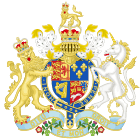Massachusetts Government Act facts for kids

|
|
| Long title | An Act for the Better Regulating the Government of the Province of the Massachusetts Bay, in New England. |
|---|---|
| Citation | 14 Geo. III c.45 |
| Introduced by | The Rt. Hon. Lord North, KG, MP Prime Minister, Chancellor of the Exchequer & Leader of the House of Commons |
| Territorial extent | Province of Massachusetts Bay |
Quick facts for kids Dates |
|
| Royal assent | 20 May 1774 |
| Commencement | 1 July 1774 |
| Other legislation | |
| Repealed by | Province of Massachusetts Bay Act 1778 (18 Geo. 3 c. 11) |
| Relates to | Intolerable Acts |
|
Status: Repealed
|
|
| Text of statute as originally enacted | |
The Massachusetts Government Act was a law passed by the Parliament of Great Britain in 1774. It got royal assent (the king's approval) on May 20, 1774. This act changed the way the Province of Massachusetts Bay was governed.
It took away many rights that colonists in Massachusetts had. The act gave the king's appointed governor much more power. Colonists were very angry about this. They felt it was unfair and went against their basic rights. This law was a big reason why the American Revolution started in 1775.
Why This Act Was Passed
This act was one of several laws known as the Intolerable Acts. These laws were also called the Repressive Acts or Coercive Acts. They were created to control the people of Massachusetts and bring order back.
The British Parliament passed these laws after the Boston Tea Party. During the Tea Party, colonists protested British taxes by dumping tea into Boston Harbor. British officials believed they couldn't control Massachusetts because its local government was too independent.
On May 2, 1774, Lord North, who was the head of the British government, spoke to Parliament. He said that Massachusetts was "in a distempered state of disturbance." He argued that this new act was needed to fix the problem.
What the Act Did
The Massachusetts Government Act changed the colony's original charter. A charter was like a special agreement that set up how the colony would be run. This act gave the king much more control.
Before this act, Massachusetts was special because its people could elect members of their executive council. This council helped the governor make decisions. The new act took away this right. Instead, the king alone could choose and remove council members.
Many other local officials, who used to be elected, were now appointed by the royal governor. Even town meetings, where citizens gathered to discuss local issues, were forbidden. They could not happen without the governor's permission. Lord North told Parliament that the act's goal was to take power away from the "democratic part of government." This meant taking power from the people.
The Governor's New Powers
The act put a lot of power into the hands of the royal governor. It took away many historic rights that colonists had to govern themselves. For example, local officials were no longer elected by the people.
The governor now had the power to choose and remove many important officials. These included judges, the attorney general, and sheriffs. He could do this without needing the council's approval.
The most important change was about town meetings. These meetings were a key way for local people to have a say in their government. The act stated that "a great abuse has been made of the power of calling such meetings." It said that people were using them to make "dangerous and unwarrantable resolves." So, no town meeting could be called without the governor's permission, except for one annual meeting to elect local officials.
How Colonists Reacted
When Governor Thomas Gage tried to use this act in October 1774, colonists in Massachusetts refused to follow it. He tried to dissolve the local assembly, but the Patriot leaders set up their own government.
They argued that the new act had broken the agreement between the king and the people. They ignored Gage's orders for new elections. Instead, they created the Massachusetts Provincial Congress. This new group acted as the government for the province. It continued to govern until Massachusetts adopted its own state constitution in 1780.
The royal governor, Thomas Gage, only had control in Boston. This was because his soldiers were based there. Outside of Boston, the new Patriot government was in charge.
The British Parliament eventually repealed this act in 1778. This was part of their effort to find a peaceful end to the ongoing American Revolutionary War.
 | James Van Der Zee |
 | Alma Thomas |
 | Ellis Wilson |
 | Margaret Taylor-Burroughs |

